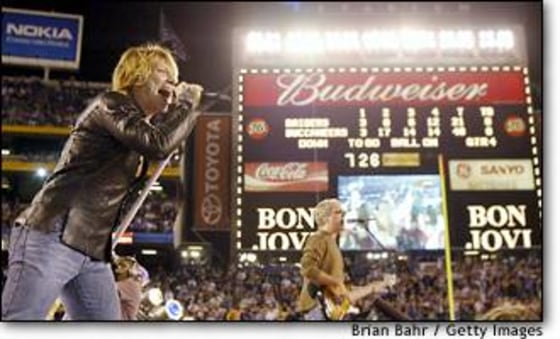As the National Football League kicks off a new season Thursday night in Washington with the New York Jets taking on the Washington Redskins, the league is scoring big off the field — becoming a business powerhouse.
Few businesses have enough clout to shut down Manhattan’s Time Square in the middle of rush hour for a Bon Jovi concert, but that’s exactly what the National Football League convinced New York City officials to do last year to kick off of its new season.
“We think of ourselves [during the] 17 weeks of the regular season as the Olympics Games, the Academy Awards and the Grammy’s every single week,” said John Collins, the NFL’s senior vice president of marketing.
Last year, the league made nearly $5 billion dollars — $1 billion more than Major League Baseball. Its television ratings — free-falling in other sports — rose 5 percent with an average of nearly 16-million viewers tuning in to any one game, and a record 90 percent of all games were sellouts.
And a small market team — the Tampa Bay Buccaneers — won the Super Bowl.
So how has the NFL become such a business bonanza?
“I think we’ve fallen into an advantage, which is games are concentrated on the weekends,” said NFL Commissioner Paul Tagliabue. People are so busy today — they’re are so many entertainment options - so that’s an advantage.”
With only 16 regular season games — compared to more than 80 in basketball and 160 in baseball — every one is critical. That week-in, week-out drama is why millions of fans pack stadiums each week and watch on television.
“We have upwards of 100-million different Americans watching some portion of our games every weekend. There’s tremendous interest in all sections of the country in NFL football,” Tagliabue said.
In the past year — the NFL has struck a $2 billion exclusive deal with Direct TV to show games on satellite, and a $300 million pact with Coors to put the company’s beer in its officially-sanctioned refrigerator next to Pepsi and Gatorade.
But the success goes much deeper. Unlike baseball, where franchises rely heavily on local television deals for a huge chunk of their overall revenue, NFL teams equally divide an eight year, $18 billion national TV contract.
“Right now that brings $80 million dollars to each of the teams — whether you’re in Green Bay, Wisconsin; Buffalo, New York; Kansas City; or New York or Chicago,” Tagliabue said.
That means each team has the same chance of signing key players and competing for the Super Bowl. It’s what League calls competitive balance and it’s working so well that during last season’s final weekend a record 19 of 30 teams had a chance to reach the post-season playoffs.
But it’s off the field where perhaps the league has scored its biggest gain financially. Four years ago, the NFL went to Wall Street to sell bonds to raise cash to help build new stadiums like this one in Philadelphia. The money was loaned to team owners to cover construction costs at a low interest rate.
“We’ve tried to approach the cost of building stadiums in a balanced way and that’s included an unprecedented commitment for us, which makes us the only league to take a piece of television revenue and invest it in stadiums at the league level,” Tagliabue said.
But even as the NFL is blazing new trails — it has remained true to its core business beliefs — among them requiring local-franchise ownership and only by individuals and not corporations — rules the Commissioner says won’t change anytime soon.
In fact, don’t expect many things to change for a league thriving on the field and off. “We think selling out stadiums, having the fans passionate about a great game and having very large audiences on television are probably the best measures of success, and certainly when the public is asked what is their favorite sport, a big part of the public says NFL football,” Tagliabue said.
In fact, Tagliabue is betting that there’s so much passion for the game that this November the NFL will launch its own cable-television network to keep fans tuning in.
